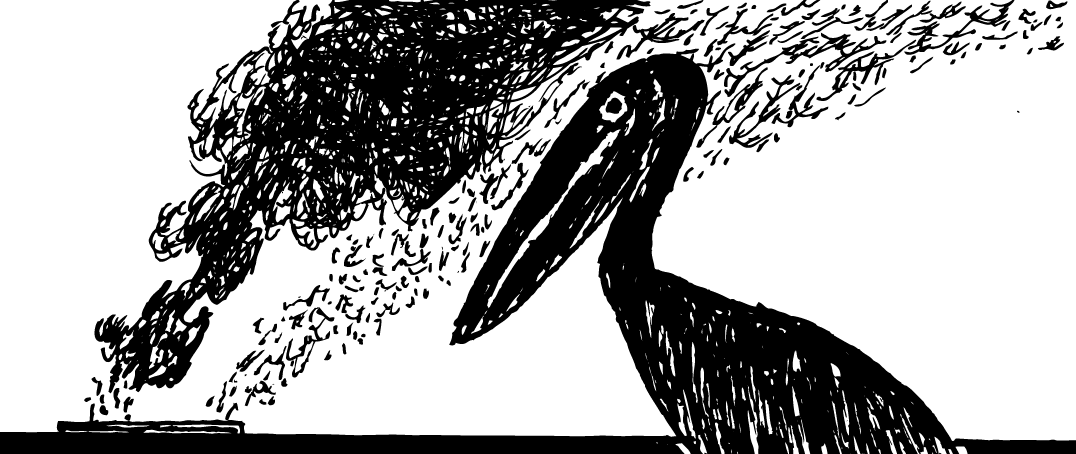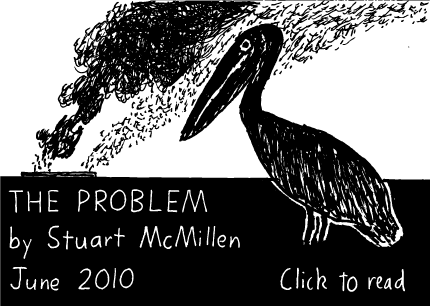The Problem comic – discussion

Earlier today I launched my latest cartoon “The Problem”. Things had been a little quiet on my cartoon website because I’ve been busy with other projects, and (more importantly) waiting for inspiration to strike. Inspiration for this one came on Friday night and I spent all of Saturday and some of Sunday working on it.
Since the meaning behind some of my cartoons are sometimes debated by readers, for this one I thought I’d get on the front foot and explain myself.
Inspiration
Although some of the imagery relates to BP’s current oil spill in the Gulf of Mexico, the cartoon was written as a broader critique of the fossil fuel lobby and the undue influence they have in our economies and political systems.
Left? Right? Centre?
My main concern is that this cartoon will be tagged as some ‘lefty rant’. How sad is it that environmental issues are chiefly seen as a so-called ‘left-wing concern’, as if conservatives are somehow able to tolerate the man-made toxins and ills that stem from unsound business practices. I can’t understand the antagonistic fanaticism that some people hold for activities that clearly have destructive consequences, yet align with a deep-seated ideology towards status quo.
Environmental concerns should cut across the spectrum of political ideologies, and I hope my cartoons can be a part of the chorus of voices trying to demonstrate that ‘the economy’ and ‘the environment’ are not polar opposites. Why settle for second-best? If an activity produces 80% ‘good’ and 20% ‘bad’ for society, let’s work to make the equation 100% ‘good’ and 0% ‘bad’.
The roles of business and government
The first thing to change must be the current muddied distinction between business and government. As the cartoon alludes, businesses spend an excessive amount of time and resources lobbying governments, donating money to politicians, and generally trying to be the ones setting the rules of the economy. At the same time, governments too often wade into the domain of free enterprise – setting prices, picking winners and establishing programs that could be more efficiently implemented by industry.
The role of government
Governments have the critical role in setting the laws and standards for which business must abide. Taking the role of the ‘guardian’, governments sets the vision for the world and the climate for the behaviour of business. Taking care not to be too prescriptive, governments give businesses incentive to innovate by setting targets for energy efficiency, materials recycling. Through law, they also determine the activities which are unacceptable, such as the use and disposal of certain chemicals as advised by scientists.
The role of business
If governments have a talent for standards and regulation, the innate talent of free enterprise is creativity and innovation. In a healthy commercial system, industry wastes no time resisting government legislation and instead employs bright minds and lateral thinking to meet and exceed the targets set by governments. Realising that laws and standards apply to their competitors as equally as it applies to them, successful businesses seek competitive advantage from surpassing the competition whilst working within the framework set by governments.
The distinction must be made clear. Governments should be steering the boat and industry should be rowing. If the government sticks to what it is good at, and industry sticks to what it is good at, the whole system will work efficiently.
A price on pollution: the economy as the solution
The individuals who built the companies and institutions behind the industrial economy didn’t set out to make a system that slowly destroys the life on Earth. I’m sure the current CEOs and leaders of industry don’t want to leave that legacy either. Unfortunately, that’s what is happening as a result of ‘business as usual’.
Although often historically ignored and counted as ‘zero’, damage to the environment is a major cost that reduces our future ability to live a quality life. As the cartoon alludes, whenever there is an ‘externality’ from industry to the environment (for example, water pollution), it falls upon society to cover the ‘cost’ of this mistake. The most efficient way to correct this market failure is to calculate the cost to society from damaging behaviours, and impose the costs on the polluters.
Adding taxes to pollution do not ‘add costs’ to the economy as some might claim. Rather, they redistribute society’s costs towards the party responsible for the damage, giving direct incentive for improvements to be made. By enforcing a price on pollution and regularly raising environmental standards, it is amazing how quickly industry uses its talents of innovation to find cleaner (and therefore cheaper) ways of doing business. Unfortunately, this will not happen while it is still considered ‘free’ to pollute, as is currently the situation for many toxic activities.
Putting it all together
In short, the negative, mucky way of conducting business that I describe in the cartoon can be reversed. All it takes from business is a positive attitude which focuses on its natural talent for innovation and efficiency. Transferring its resources away from lawyers, lobbyists and spin-doctors and towards scientists, engineers and inventors. All it takes from governments is the courage to stand firm in the face of the vested interests of lobby grounds and act in the public interest. Governments must understand that for every laggard business that whinges about complying with government standards (“we cant”), there is always a cunning competitor profiting by leading the way (“we are”).
More reading
To dive deeper into these issues and learn about ways that business must reinvent itself, beg, borrow or steal the books “Cradle to Cradle” (2002), “The Ecology of Commerce” (1993) and “Natural Capitalism” (1999). (I lament my need to re-emphasise the compelling views of these authors in 2010, given the original publication date of the books!)
Keep your eyes peeled (and your accounts subscribed) for more illustrated ideas about the green economy in the coming months. edit: the comic I was referring to is Green Tax Shift, which was released 5 months after this post.









Comments
půjčky online
Musíte pečlivě analyzovat a poté vyberte věřitele protože tam byly hodně případů přichází ve světle, kdy rozvíjející se finanční společnosti se snaží přilákat dlužníkům s nejlepšími nabídkami, ale pak se ukáže, že je podvod na pozdní . Online výplata firmy pracovat podobně jako cihel a malty věřiteli v tom, že souhlasí s tím, aby úvěrových žádostí a vyberte možnost schválit nebo zamítnout žádosti . Chcete-li získat z takového stavu, nejlepší způsob je požádat o hotovostní půjčky on-line snadno dostupné na trhu .
Stephanie
Hello, Mr. McMillen! And thank you for your insight and creative illumination of the problems of insufficiently regulated industry. I value your work and your discussion of environmental issues and applaud your efforts to formulate potential solutions. I'm a student who hopes to go into public policy in America, and I've been following your cartoons for some time as a source of inspiration and hope. There ARE ways for our governments and businesses to change, there ARE ways to turn the deterioration of our planet around, there ARE ways for businesses to be on the "good" side of this fight. I hope many more people come to your sight and are inspired in the way I have been. Thanks again!
The Problem < Recombinant Records
[...] some expanded thoughts on ideas contained in the cartoon. Post a comment | Trackback [...]
John
Hi Stuart. You're cartoon is as incisive as ever! Your additional thoughts are also greatly appreciated - thank you. Keep shining the light please.Notice of your post came through to me just as I was writing a response in another forum (Linked In) to the question "If money were no object what would you do about the situation in the Gulf?"The answer I gave is now supplemented by a link to this cartoon.In the spirit of sharing this is what I answered:"Money no object? How about investment in oil alternatives so there is no call for risky extraction practices in the first place? If drilling did not compromise the oil well there would be no threat to the keys ecosystem or the livelihood of others who formerly made a living based on the natural assets of the region. What has happened could be thought of as a Chernobyl of Oil - the "need" for energy overrides the normal tolerances of risk creating a hair-trigger potential, which in Chernobyl and the Gulf of Mexico was arguably tripped by an accident waiting to happen. The sun provides something in the order of 15 times our global energy demand and yet there is next to no investment in harnessing that potential - why? Maybe because the sun arrives here for free? - No government can issue an exploration license or tax extraction for sunshine? Maybe because no cartel can control the supply there is no real investment incentive because the market is beyond manipulation? Sure, anyone with the right conversion technology can sell the energy collected, but there is still the problem of storage (if we stick to the silo thinking of electricity as the only form of converted sunshine) and it is not a sector with the potential to concentrate wealth in the hands of a few like oil does, so few institutional investors are really interested - 'returns' look better with business as usual folks... The Exxon Valdez didn't really change the way we do business, neither will the GoM-BP catastrophe, since these are symptoms not causes. BP likes to claim that it has made the paradigm shift from an oil company to an energy company - did so way back in Rio at the Earth Summit (or around that time) if memory serves, so what the hell has been happening in the 18 years since then?"